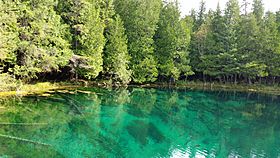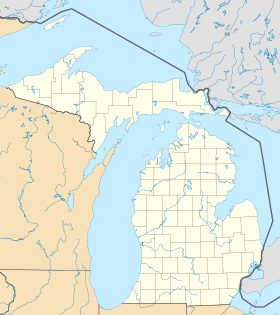Palms Book State Park facts for kids
Quick facts for kids Palms Book State Park |
|
|---|---|
|
IUCN Category III (Natural Monument)
|
|

Kitch-iti-kipi within Palms Book State Park
|
|
| Location | Upper Peninsula, Schoolcraft County, Michigan, United States |
| Nearest city | Manistique, Michigan |
| Area | 388 acres (157 ha) |
| Elevation | 614 feet (187 m) |
| Designation | Michigan state park |
| Established | 1929 |
| Named for | Palms and Book Land Company |
| Administrator | Michigan Department of Natural Resources |
| Website | Palms Book State Park |
Palms Book State Park is a special nature area in Michigan's Upper Peninsula. It covers about 388 acres. This park is famous for its amazing natural spring called Kitch-iti-kipi. People often call it the "Big Spring" of the Upper Peninsula. It's a great place to visit and see nature's wonders.
Contents
Park History and Creation
This state park was created in 1929. The land was sold to the state in 1926 by a group called the Palms and Book Land Company. They wanted the park to be named after their company. They also asked that no camping be allowed in the park.
A man named John I. Bellaire helped make this happen. He arranged for 90 acres of land to be sold to the state for only $10! In the 1930s, a group called the Civilian Conservation Corps (CCC) helped improve the park. They built things like an observation raft, a dock, and a home for the park ranger.
Discovering Kitch-iti-kipi: The Big Spring
Kitch-iti-kipi is the park's main attraction. It is a large pool of incredibly clear water. The spring is about 400 feet (120 meters) across at its widest point. It is also quite deep, reaching up to 40 feet (12 meters).
You can see the water bubbling up from the bottom of the pond. It comes through bedrock limestone and sand. This creates cool, swirling patterns in the water. The water in the spring stays at 45°F (7°C) all year round. This means it's cool in summer and doesn't freeze in winter!
Exploring the Spring by Raft
Since the 1930s, visitors have been able to explore the spring on a special raft. This raft is moved by hand and is guided by cables. It takes you out onto the water so you can look down into the clear depths. You can see the bottom of the spring and even the trout that live there.
Cultural Significance of the Spring
For the Anishinaabe people, who were the first inhabitants of this area, Kitch-iti-kipi was a very important place. They saw it as a place of mystery and wonder. Its unique features made it a special site for them.
Connection to Indian Lake
A lot of water flows out of Kitch-iti-kipi. More than 10,000 gallons (40,000 liters) of water per minute leave the spring. This water then flows into nearby Indian Lake. Palms Book State Park protects about 1 mile (1.6 kilometers) of the lake's edge.
 | William M. Jackson |
 | Juan E. Gilbert |
 | Neil deGrasse Tyson |


